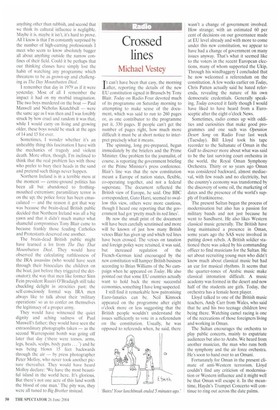Crossed lines
Michael Vestey
Tt can't have been that easy, the morning after, reporting the details of the new EU constitution signed in Brussels by Tony Blair. Today on Radio Four devoted much of its programme on Saturday morning to attempting to make sense of the document, which was said to run to 260 pages or, as one contributor to the programme put it, 330 pages. If people can't get the number of pages right, how much more difficult it must be at short notice to interpret precisely what it means.
The spinning, long pre-prepared, began immediately by the briefers and the Prime Minister. One problem for the journalist, of course, is reporting the government briefing or the Prime Minister's press conference. I3lair's line was that the new constitution meant a Europe of nation states, flexible, co-operating together, and not a federal superstate. The document reflected the British view of Europe, he said. One BBC correspondent, Guto Harri, seemed to swallow this view, others were more cautious, though I heard one reporting that the government had got 'pretty much its red lines'.
By now the small print of the document will have been carefully scrutinised and more will be known of just how many British vetoes Blair has given up and which red lines have been crossed. The vetoes on taxation and foreign policy were retained, it was said, but increased regulation of the French–German kind encouraged by the new constitution will hamper British business according to Brian Williams of the No campaign when he appeared on Today. He also pointed out that some EU countries actually want to hold back the more successful economies, something I have long suspected.
I still find it remarkable how patronising Euro-fanatics can be. Neil Kinnock appeared on the programme after eight o'clock more or less suggesting that the British people wouldn't understand the issues sufficiently to vote in a referendum on the constitution. Usually, he was opposed to referenda when, he said, there wasn't a change of government involved. How strange; with an estimated 60 per cent of decisions on our governance made at EU level already and with more to come under this new constitution, we appear to have had a change of government on many issues anyway. That's what it seemed like to the voters in the recent European elections, many of whom supported the Ukip. Through his windbaggery I concluded that he now welcomed a referendum on the constitution. A few weeks earlier on Today, Chris Patten actually said he hated referenda, revealing the nature of his own democratic credentials. Generally speaking, Today covered it fairly though I would have liked to have heard from a Eurosceptic after the eight o'clock News.
Sometimes, radio comes up with oddities and curiosities that make good programmes and one such was Operation Desert Song on Radio Four last week (Tuesday). Bill Lloyd took his tape recorder to the Sultanate of Oman in the Gulf to discover more about what was said to be the last surviving court orchestra in the world, the Royal Oman Symphony Orchestra. Thirty or so years ago Oman was considered backward, almost mediaeval, with few roads and no electricity, but the country's economy was transformed by the discovery of some oil, the marketing of dates and the presence of the world's supply of frankincense.
The present Sultan began the process of modernisation but also has a passion for military bands and not just because he went to Sandhurst. He also likes Western classical music generally. The British have long maintained a presence in Oman, some years ago the SAS were involved in putting down rebels. A British soldier stationed there was asked by his commanding officer to find musicians for the Sultan. He set about recruiting young men who didn't know much about classical music but had an ear for musical rhythms. It seems that the quarter-tones of Arabic music make classical intonation difficult. A music academy was formed in the desert and now half of the students are girls. Today, the orchestra has a female horn player.
Lloyd talked to one of the British music teachers, Andy Carr from Wales, who said that he and his two teenage children love being there. Watching camel racing is one of the recreations of those foreigners living and working in Oman.
The Sultan encourages the orchestra to play public concerts, mainly to expatriate audiences but also to Arabs. We heard from another musician, the man who runs both the symphony and the air force orchestra. He's soon to hand over to an Omani,
Fortunately for Oman in the present climate of anti-Western terrorism, Lloyd couldn't find any criticism of modernisation or Western influence and it might well be that Oman will escape it, In the meantime, Haydn's Trumpet Concerto will continue to ring out across the date palms.


































































 Previous page
Previous page